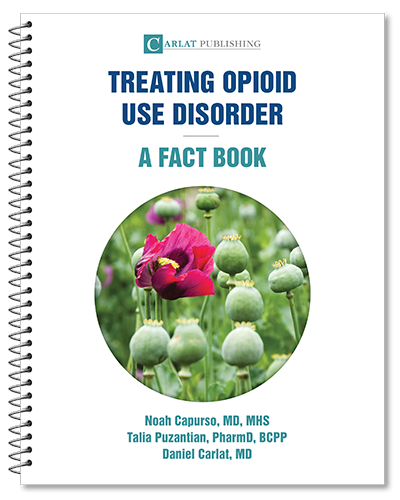Home » Does Augmenting Varenicline with Bupropion Work Better than Varenicline Alone?
Does Augmenting Varenicline with Bupropion Work Better than Varenicline Alone?
February 27, 2019
From The Carlat Addiction Treatment Report
Jessica Goren, PharmD.
Dr. Goren has disclosed that she has no relevant financial or other interests in any commercial companies pertaining to this educational activity.
Review Of: Cinciripini PM et al, Addiction 2018;113:1673-1682
We have a good array of smoking cessation treatments to choose from, including nicotine replacement therapy (NRT), bupropion, and varenicline. Varenicline is the most effective monotherapy agent, somewhat better than bupropion and single-product NRT, and comparable to combination NRT. Theoretically, adding bupropion to varenicline would be even more effective. A couple of studies have tested this strategy with mixed results. This latest study attempted to further clarify the efficacy of this combination.
Researchers randomly assigned smokers (at least 1 pack per day) to three treatment arms: varenicline alone (n=166), varenicline plus bupropion (n=163), and placebo (n=56). All participants were also given behavioral therapy (13 in-person individual 15-minute visits for smoking cessation counseling and two brief supportive telephone sessions) for 12 weeks of active treatment. They were then followed for 12 months. The primary outcome measure was abstinence at 1 year, which was verified by measuring expired carbon monoxide. The majority of participants were male (58%), and the average age was 49.
After 12 months, the quit rates were similar in the two active treatment groups. Beginning with the last four weeks of treatment, participants on varenicline had a continuous abstinence rate of 22.29% vs 20.25% for the varenicline+bupropion group. Both of these were superior to placebo, with a continuous abstinence rate of 5.36%.
As expected, the rate of adverse events was higher in the combination (98.1%) and varenicline only (95.78%) groups compared with placebo (89.29%, p<0.021). Specifically, varenicline+bupropion participants experienced decreased appetite, altered taste, and increased dry mouth, insomnia, creatinine and edema compared with placebo. Varenicline only participants had increased rates of abnormal dreams, diarrhea, and nausea compared with placebo.
CATR’s Take
While it’s tempting to combine two effective treatments, it appears that adding bupropion to varenicline is no better than varenicline alone. While all agents can be used as first line treatment, in the Carlat Medication Fact Book, we lay out an approach to smoking cessation that starts with nicotine replacement therapy, and then moves on to either varenicline or bupropion. These results appear to be in line with that approach.
Addiction TreatmentWe have a good array of smoking cessation treatments to choose from, including nicotine replacement therapy (NRT), bupropion, and varenicline. Varenicline is the most effective monotherapy agent, somewhat better than bupropion and single-product NRT, and comparable to combination NRT. Theoretically, adding bupropion to varenicline would be even more effective. A couple of studies have tested this strategy with mixed results. This latest study attempted to further clarify the efficacy of this combination.
Researchers randomly assigned smokers (at least 1 pack per day) to three treatment arms: varenicline alone (n=166), varenicline plus bupropion (n=163), and placebo (n=56). All participants were also given behavioral therapy (13 in-person individual 15-minute visits for smoking cessation counseling and two brief supportive telephone sessions) for 12 weeks of active treatment. They were then followed for 12 months. The primary outcome measure was abstinence at 1 year, which was verified by measuring expired carbon monoxide. The majority of participants were male (58%), and the average age was 49.
After 12 months, the quit rates were similar in the two active treatment groups. Beginning with the last four weeks of treatment, participants on varenicline had a continuous abstinence rate of 22.29% vs 20.25% for the varenicline+bupropion group. Both of these were superior to placebo, with a continuous abstinence rate of 5.36%.
As expected, the rate of adverse events was higher in the combination (98.1%) and varenicline only (95.78%) groups compared with placebo (89.29%, p<0.021). Specifically, varenicline+bupropion participants experienced decreased appetite, altered taste, and increased dry mouth, insomnia, creatinine and edema compared with placebo. Varenicline only participants had increased rates of abnormal dreams, diarrhea, and nausea compared with placebo.
CATR’s Take
While it’s tempting to combine two effective treatments, it appears that adding bupropion to varenicline is no better than varenicline alone. While all agents can be used as first line treatment, in the Carlat Medication Fact Book, we lay out an approach to smoking cessation that starts with nicotine replacement therapy, and then moves on to either varenicline or bupropion. These results appear to be in line with that approach.
Issue Date: February 27, 2019
Table Of Contents
Recommended
Newsletters
Please see our Terms and Conditions, Privacy Policy, Subscription Agreement, Use of Cookies, and Hardware/Software Requirements to view our website.
© 2025 Carlat Publishing, LLC and Affiliates, All Rights Reserved.


_-The-Breakthrough-Antipsychotic-That-Could-Change-Everything.jpg?1729528747)



